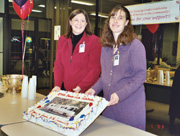 |
Lana Tribbie (left) and Cathy Binstock, both of the UNMC College of Nursing Mobile Nursing Center, show off a cake during the college’s celebration of the Cosmopolitan-UNMC College of Nursing Mobile Nursing Center and the Family Health Care Center. |
The college is celebrating 10 years of service of its Cosmopolitan-UNMC College of Nursing Mobile Nursing Center and the Family Health Care Center. The Mobile Nursing Center travels to various rural and urban locations in Nebraska and western Iowa, providing disease prevention, screening, health education, and referral and follow-up services. The Family Health Care Center is the college’s nursing center located in the Greenberg-Early South Omaha Neighborhood Association Building at 31st and Q streets.
The centers will hold a reception today (May 27) to thank community individuals and organizations who support or have supported the nursing centers.
Nursing centers have provided quality health care services to the community since the days of Lillian Wald and the Henry Street Settlement in New York City in the early 1900s. They serve as an environment for nurses to provide primary care services, disease prevention, health promotion, access, and continuity of care to those who would otherwise do without.
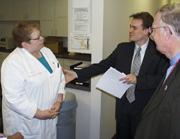 |
Anita Jaynes, certified nurse midwife, Family Health Care Center, talks about the center with Tadd Pullin, NHS vice president of marketing and strategic planning (center) and Ward Chambers, M.D., executive director, NHS/UNMC Community and Multicultural Affairs. |
Although they’ve become an important provider of “safety net health care” over the last 20 years, nursing centers receive little support from the federal government, said Kate Fiandt, D.N.S., associate professor of nursing and clinical director of the Family Health Care Center. As a result, she said, nursing centers are always at risk for closure. Few centers survive for a decade.
“It is particularly significant that the Mobile Nursing Center and the Family Health Care Center have survived and thrived since their development in 1993,” said Dr. Fiandt, who also is a nurse practitioner.
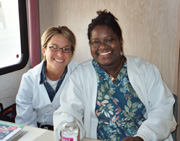 |
Taking a break in the UNMC College of Nursing Mobile Nursing Center are graduate assistant Jodi Boedle and Valerie Reviere, a Nebraska Health System nurse and Mobile Nursing center volunteer. |
The centers serve clientele who are unable to access health care services due to financial, transportation, language or other reasons.
Nursing faculty say the success of the centers is due to many factors, including the visionary support of the College of Nursing and UNMC, the dedicated faculty clinicians, and the many students who provide care at the nursing centers.
Family Health Care Center
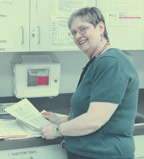 |
Kate Fiandt |
Dr. Fiandt estimates the Family Health Care Center has about 250 patient encounters a month. Since 1997, clinic faculty have provided about 10,000 hours of clinical work, with 500 to 600 hours by students. It’s currently is staffed by eight nurse practitioners and nurses, including two retired faculty members, one physician, students and staff.
“I can’t believe it’s been 10 years,” Dr. Fiandt said.
More than 70 percent of its patients are uninsured and live in poverty. Those services that are paid for are done so through health insurance, Medicaid and Medicare and a sliding scale fee system. No patient is denied help due to inability to pay.
Dr. Fiandt said hundreds of thousands of dollars in care are donated, including from UNMC, grants, fundraising, the Hope Medical Outreach Coalition of Omaha, which provides discount pharmacy services and others.
“We have a lot of community partners. It’s really important,” Dr. Fiandt said. “We very much appreciate especially how supportive UNMC and the college are. Our clinics help keep patients out of the emergency room, which costs more.”
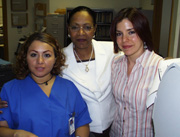 |
Part of the team at the Family Health Care Center are (left to right): Rina Chica, certified medical assistant, Aura Whitney-Jackson, South Omaha community liaison, NHS/UNMC Community and Multicultural Affairs, and Veronica Rivera, clinic clerk, Family Health Care Center. |
Other services that operate as part of the center are the student-run Student Health Alliance Reaching Indigent Needy Groups (SHARING) and the Responsible Early STD Prevention, Education & Community Testing (RESPECT) clinics.
The clients aren’t the only ones getting a lot from the health services.
“One thing that’s said is people’s work is most satisfying when they know they’re doing a job that makes a difference,” said Dr. Fiandt, who’s been taking care of patients for 26 years. “The sense to walk away at the end of the day knowing you’ve done something good.”
Dr. Fiandt said there are a lot of people alive today who wouldn’t be without the help of the clinic.
A man without health insurance came to the clinic with blood pressure so high that surely he would have ultimately died or lost function of his kidneys, Dr. Fiandt said. Five years later, his blood pressure is within normal limits. “Now he can go about his life and be a functional citizen,” Dr. Fiandt said.
Then there are others who have insurance who’ve developed strong patient-client bonds and insist on seeing faculty at the clinic. “There are so many people that need someone to pay attention to them. We talk about the concept in nursing to be present…to have presence with the patient. These patients have an intensity of need that can’t be provided in a 10- to 15-minute encounter,” Dr. Fiandt said.
Dr. Fiandt also remembers another woman in such poor health that someone literally drove her to the clinic for help. One year later, the woman was showing off a photo of her granddaughter. “She said she wouldn’t be here today if it weren’t for the clinic,” Dr. Fiandt said. “It means a lot to me. I value those things.”
The clinic also has made more people aware of what nurse practitioners do.
Barb Owen has been seeing Dr. Fiandt for about five years. “Kate has helped me a lot,” said Owen, who has lung problems. “Recently, she put me on a nebulizer. This is a miracle. It’s helped a lot. I feel so much better and my voice is coming back. I have the utmost trust in her.”
Cosmopolitan-UNMC College of Nursing Mobile Nursing Center
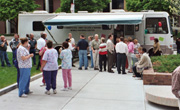 |
UNMC faculty, students and staff attended an ice cream social recently for the 10th anniversary celebration of the Cosmopolitan-UNMC College of Nursing Mobile Nursing Center and the Family Health Care Center. |
Ten years ago, on April 6, 1993, the Cosmopolitan-UNMC College of Nursing Mobile Nursing Center set off on its “maiden voyage” with a broad range of services, and focus on preventing and screening for type 2 diabetes. It was organized in 1992 as a collaborative project between the college and the Cornbelt Diabetes Connection Inc., a local federation of Cosmopolitan International, a non-profit service organization that funds diabetes projects and supports diabetes research.
Since 1993, the center has traveled more than 54,000 miles, with nearly 19,595 patient visits, serving those who cannot easily access basic health screening, education, counseling and referral services because of transportation, financial or language barriers.
Their “clinic” is a 36-foot, custom-built Coachman motor home that contains 325 square feet of space, including private patient consultation areas, an exam room, areas for laboratory testing, three computer stations with Internet and electronic mail capability, television and videocassette recorder, and a satellite receiver capable of being used for educational purposes.
Staff members currently provide services in the Nebraska cities of Ashland, Bellevue, Blair, Burwell, Fremont, Grand Island, Lincoln, Minden, Omaha, Palmyra, Panama, Ravenna, Sargent, Spalding, Valparaiso, Wahoo, Weeping Water and West Point. In Iowa, they travel to Council Bluffs and Sioux City.
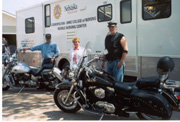 |
Susan DeVries (middle), project nurse with the Mobile Nursing Center provided health screening and education May 17, to a group of members of a Sargent, Neb., motorcycle club. Richard Clark (far left) and Lyle Runyan were part of the group. Staff from the Eppley Cancer Center also were involved in the event. |
Kathleen Barr, Ph.D., and Catherine Todero, Ph.D., both founders of the Mobile Nursing Center and associate professors in the College of Nursing, say their services have made an impact through the years. The center’s services have included referring patients for many conditions besides diabetes, including hypertension, hyperlipidemia, heart failure, suspected cancer and torn retinas. They also provide disease management services for certain chronic conditions.
Staff members see the value of its work each time they go into a community.
“By removing access barriers, we’ve improved entry into the health care system by bringing health services directly into the community,” Dr. Barr said. “We have improved access for many underserved Nebraskans by going to their schools, churches, businesses, senior centers and community health events.
“Our way of delivering services also helps the newly immigrated Latino population access the system. When you’re new in a country and don’t speak the language, navigating the health system gets even more complex.”
She said continuing to secure funding to staff the project is a priority, and a persistent challenge.
“Since the beginning, we’ve been able to provide many of our health services at little or no cost through grants, health service contracts and continued support of Cosmopolitan International and the Cornbelt Diabetes Connection, Inc.,” Dr. Barr said.
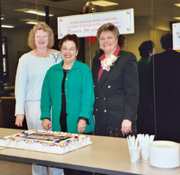 |
Part of the founding team of the UNMC College of Nursing Mobile Nursing Center. Left to right are Louise LaFramboise, Ph.D., Kathleen Barr, Ph.D., and Catherine Todero, Ph.D. |
The Cornbelt Diabetes Connection, Inc., of Omaha, pays for the motor home, the maintenance, its driver and health screening supplies.
“They work so hard. It’s not like they funded us and they want a report,” Dr. Barr said. “They have an intense interest and are dedicated to the eradication of diabetes.”
Jerry Nelson, president of the corporation, said the Mobile Nursing Center has come a long way. “I think it’s pretty remarkable that a project like this has made it this far,” Nelson said. “Our club internationally is all about diabetes and working toward the cure. This service is especially important for those people who have diabetes but don’t know it.”
Susan DeVries, Mobile Nursing Center project nurse, said of all the nursing specialty areas in which she’s worked – intensive care, trauma, burn units and home care – working for the Mobile Nursing Center in a community-based setting is her favorite.
 |
A group of UNMC College of Nursing staff and students, and members of the Cornbelt Diabetes Connection, Inc., recently provided health screenings at a health event at Westside High School. |
“I like being in the community. It’s not as structured as a hospital. What we try to do is focus on preventing disease and illness and keep people out of the hospital,” DeVries said. “Our services empower people to take charge of their own health. People don’t usually know their own blood pressure but if they do, they are more likely to take steps to lower it.”
There are many examples how she’s helped people. One time, she sent a woman with dangerously high blood pressure to the emergency room then called the woman’s daughter.
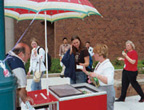 |
Bob Tallman and Susan DeVries handed out ice cream during the campus celebration of the 10th anniversary celebration of the Cosmopolitan-UNMC College of Nursing Mobile Nursing Center and the Family Health Care Center. Tallman is the driver for the Mobile Nursing Center and DeVries is project nurse. |
“She later thanked me and gave me a big hug and a kiss. That’s really nice. Now, every time she sees me when we do screenings at Our Lady of Guadalupe church (in South Omaha), she comes up and hugs me.” She also advised a fireman in his 20s with high blood pressure to see his physician. The man now is on medication to control his pressure.
“It’s fun. It’s my favorite nursing job. The more you put into it, the more people see you care about what you’re doing.”